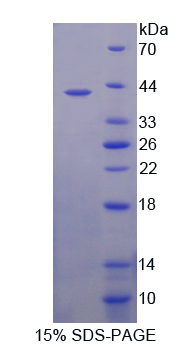Recombinant Serotonin Transporter (SERT) 

SLC6A4; SLC6-A4; HTT; 5-HTT; 5HTT; OCD1; hSERT; Solute Carrier Family 6,Member 4; Neurotransmitter Transporter,Serotonin; Sodium-dependent serotonin transporter
Overview
Properties
- Product No.RPC890Hu01
- Organism SpeciesHomo sapiens (Human) Same name, Different species.
-
Applications
Positive Control; Immunogen; SDS-PAGE; WB.
If bio-activity of the protein is needed, please check active protein.
Research use only - DownloadInstruction Manual
- CategoryNeuro science
- Source Prokaryotic expression, Host E.coli
- Endotoxin Level<1.0EU per 1µg (determined by the LAL method)
- Subcellular LocationChromosome
- Molecular Mass 38.3kDa, Accurate 38kDa(Analysis of differences refer to the manual)
- Residues & TagsAla181~Ser252 with N-terminal His and GST Tag
- Buffer Formulation20mM Tris, 150mM NaCl, pH8.0, containing 1mM EDTA, 1mM DTT, 0.01% SKL, 5% Trehalose and Proclin300.
- Traits Freeze-dried powder, Purity > 90%
- Isoelectric Point6.2
Share your citation
Upload your experimental result
Review
Leave a message
Loading...
Sign into your account
Share a new citation as an author
Upload your experimental result
Review
Please attach serial No. on instruction manual


Contact us
Please fill in the blank.
Name*
Organization
Address
E-mail address*
Telephone
Inquiry*
Verification code*

Sequence

Usage
Reconstitute in 20mM Tris, 150mM NaCl (pH8.0) to a concentration of 0.1-1.0 mg/mL. Do not vortex.
Storage
Avoid repeated freeze/thaw cycles. Store at 2-8°C for one month. Aliquot and store at -80°C for 12 months.
Stability
The thermal stability is described by the loss rate. The loss rate was determined by accelerated thermal degradation test, that is, incubate the protein at 37°C for 48h, and no obvious degradation and precipitation were observed. The loss rate is less than 5% within the expiration date under appropriate storage condition.
Increment services
-
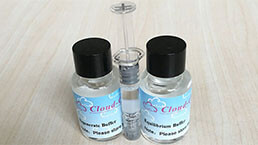 Endotoxin Removal Kit
Endotoxin Removal Kit
-
 BCA Protein Quantification Kit
BCA Protein Quantification Kit
-
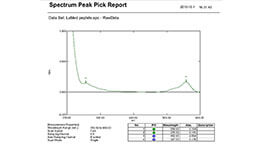 Protein Labeling Customized Service
Protein Labeling Customized Service
-
 Molecular Mass Marker for Protein
Molecular Mass Marker for Protein
-
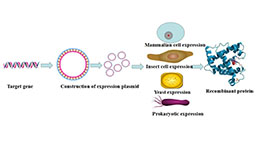 Recombinant Protein Customized Service
Recombinant Protein Customized Service
-
 Monoclonal Antibody Customized Service
Monoclonal Antibody Customized Service
-
 Polyclonal Antibody Customized Service
Polyclonal Antibody Customized Service
-
 Protein Activity Test Experiment Service
Protein Activity Test Experiment Service
-
 Immunoprecipitation (IP) Experiment Service
Immunoprecipitation (IP) Experiment Service
-
 Buffer
Buffer
-
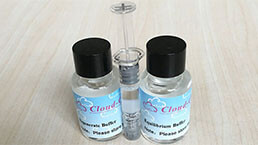 Endotoxin Removal Kit II
Endotoxin Removal Kit II
-
 Real Time PCR Experimental Service
Real Time PCR Experimental Service
-
 Spike RBD Protein (S-RBD)
Spike RBD Protein (S-RBD)
-
 Protein G
Protein G
-
 Protein A
Protein A
Citations
- Comparison of platelet serotonin transporter activity in subjects with severe sleep bruxism and controlPubmed:25127373
- Experimental heart failure causes depression-like behavior together with differential regulation of inflammatory and structural genes in the brainPubmed:25400562
- Sleep bruxism frequency and platelet serotonin transporter activities in young adult subjectsPubMed: 26527205
- Non-Serotonergic Neurotoxicity by MDMA (Ecstasy) in Neurons Derived fromMouse P19 Embryonal Carcinoma Cells.pubmed:27861613
- Herz-Hirn Interaktion im Mausmodell: Herzinsuffizienz nach Myokardinfarkt führt zu depressivem Verhalten bei Mäusenfrontdoor:index
- Effects of Junk Foods on Brain Neurotransmitters (Dopamine and Serotonin) and some Biochemical Parameters in Albino Ratsarticle_1486_c0fa9f8afe5f70b407e7195bcfd55c70
- Neuro-and nephroprotective effect of grape seed proanthocyanidin extract against carboplatin and thalidomide through modulation of inflammation, tumor …Pubmed:29854627
- Neurotoxicity and inflammation induced by individual and combined exposure to iron oxide nanoparticles and silver nanoparticles
- Effects of regulating gut microbiota on the serotonin metabolism in the chronic unpredictable mild stress rat modelPubmed: 31323174
- VAMP8 and serotonin transporter levels are associated with venous thrombosis risk in a Spanish female population. Results from the RETROVE ProjectPubmed: 31382081
- Neuronal Cell Death Induces Depressive Disorder in Rats Depression-Like Behaviors Caused by Chronic Stress
- Administration of a Probiotic Mixture Ameliorates Cisplatin-Induced Mucositis and Pica by Regulating 5-HT in Rats34568500
- Targeting the oxytocin system to ameliorate early life depressive-like behaviors in maternally-separated rats34349049






